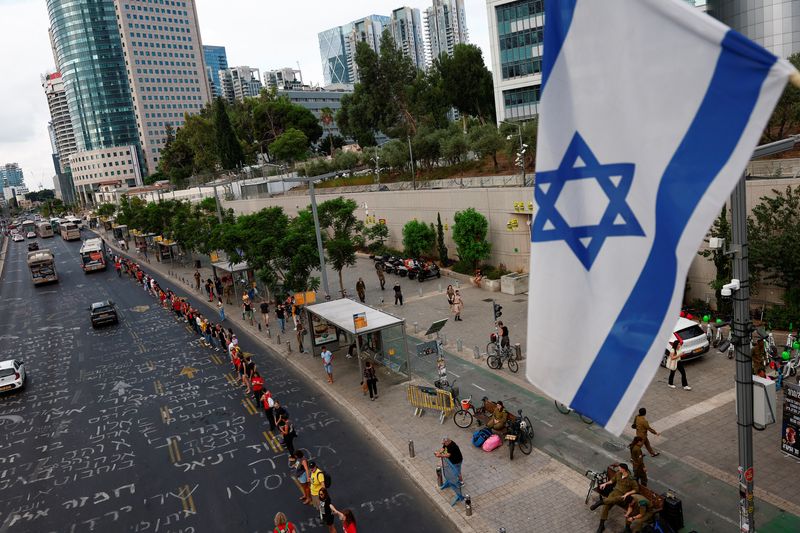By James Mackenzie
JERUSALEM (Reuters) - While much of the world has focused on Israel's military response to the Oct. 7 Hamas attacks, and the devastation it has caused, Israelis' lives in the past year have been overshadowed by the trauma of that day.
The attack was the worst disaster in Israel's history, leaving the country reeling from the failure of its often vaunted military to protect its people.
"I think Israel is a country that is still grieving, that I don't think was fully able to go through the grief and process what happened on Oct. 7," said Hen Mazzig, a senior fellow at the Tel Aviv Institute, a pro-Israel advocacy group.
Hamas-led gunmen killed some 1,200 people during a rampage through communities in southern Israel and took more than 250 hostages into Gaza, according to Israeli figures, the worst single-day loss of life for Jews since the Nazi Holocaust.
Israel's response, aimed at eliminating Hamas, has levelled Gaza, killing nearly 42,000 people, according to Palestinian health officials, and displacing nearly all its 2.3 million people.
As the war reaches its first anniversary, Israelis face a wider war with the Iranian-backed Hezbollah in Lebanon and potentially with Iran itself, which launched a barrage of missiles at Israel last week.
Although increasing numbers of Israelis have called for a ceasefire in Gaza recently, there has also been wide support for war against Hamas and Hezbollah, which the Israeli military says had plans to launch an Oct. 7-style attack of its own in northern Israel. Some 80% of Israelis said it was right to launch an offensive against Hezbollah even though the war in Gaza is still going on, according to a survey for the Israel Democracy Institute last week.
But the failure to bring the hostages home remains an open wound. There have been mass protests demanding the government do more to get them back and growing calls for a ceasefire in Gaza, with bitter criticism by protesters of Prime Minister Benjamin Netanyahu.
However images of the suffering of Palestinians in Gaza are almost totally absent from television, apart from footage filmed by the military or reports from embedded journalists accompanying Israeli troops.
There is also little recognition for the fact that for Palestinians, the destruction of Gaza has reminded them of their own historical trauma, the loss of their land in the Nakba - or catastrophe - after the war that erupted when the state of Israel was founded in 1948.
Instead, there has been a general hardening of attitudes and a sense that Israelis and Palestinians feel further apart than ever.
For Avida Bachar, a farmer from the kibbutz of Be'eri who lost his leg and watched his wife and son die when Hamas gunmen attacked his home one year ago, there is one solution to the Israeli-Palestinian conflict.
Palestinians must be moved from Gaza to any state willing to take them, so they can no longer threaten Israel, he says.
"We only have one option to solve this, which is to transfer them to other sovereign states."
'NO LONGER YOUR FRIEND'
In Israel, armed civilians are visible everywhere, on edge for attacks by Palestinians who many feel sympathized with the Oct. 7 attack.
Abu Yousef, 70, a Palestinian from Kafr Manda, a Palestinian village in northern Israel, who used to work with Israelis on farms and in vegetable markets, said everything changed after Oct. 7.
"We used to have Jewish friends, we would ask about each other's families. But one who was your friend before, is no longer your friend."
For Jewish Israelis, the events of Oct. 7 had existential implications, echoing the pogroms in Europe of past centuries and laying bare the fight for survival many feel their country faces against enemies on all sides, with Iran pulling the strings.
"The feeling is there's no security in this place. Anything can happen," said Alex Kaidrikov from Tel Aviv, who said he narrowly missed an attack last week by two Palestinian gunmen that killed seven people, on the day Iran launched a ballistic missile barrage at Israel.
"It's just shocking and overwhelming, and there's nothing we can do about it," he said.
The trauma has been compounded by the way initial sympathy from much of the world over the Oct. 7 attack shifted to condemnation over Israel's campaign in Gaza.
Israel, founded in the wake of the Nazi Holocaust, faces allegations of genocide at the International Court of Justice and Netanyahu has been bracketed with the leader of Hamas, a group branded a terrorist organization by many Western countries, in a prosecution request at the International Criminal Court for an arrest warrant alleged war crimes.
Netanyahu has dismissed the allegations of genocide. He has rejected the prosecution request as "absurd" and said it was directed against the whole of Israel, an example of the "new antisemitism".
For many in Israel, the global mood, which has seen a sharp rise in both antisemitic and Islamophobic incidents, reflects a mix of Western naivete and deliberate manipulation by Hamas and its sympathizers. But even liberal Israelis have felt hurt by the feeling the world has turned against their country.

Maayan, 37, a product manager from Tel Aviv who gave only her first name, said she understood the upset over the suffering in Gaza. But she felt many protests seemed aimed at delegitimizing Israel or even calling into question its right to exist.
"At the end of the day, I'm Israeli. I have nowhere else to go," she said. "So I do find it a little painful."
